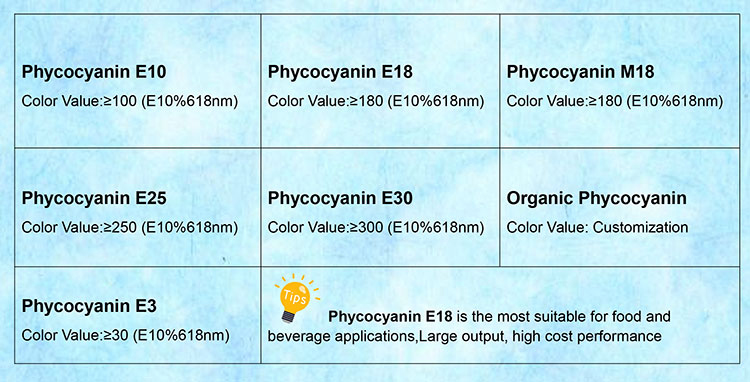Phycocyanin is a natural blue pigment and a water-soluble protein found in certain types of blue-green algae, particularly Spirulina and some species of cyanobacteria. It has gained attention for its potential health benefits, and while some of its effects have been studied, more research is needed to fully understand its efficacy and effects. Here are some of the known or potential benefits and effects of phycocyanin:
Antioxidant Properties: Phycocyanin is known for its strong antioxidant properties. Antioxidants help protect cells from oxidative stress, which can lead to various health issues, including chronic diseases and aging.
Anti-Inflammatory Effects: Some studies suggest that phycocyanin may have anti-inflammatory properties. Inflammation is associated with various diseases, so reducing inflammation can have health benefits.
Immune System Support: Phycocyanin may stimulate the production of white blood cells and enhance the immune system’s response to infections and diseases.
Anticancer Potential: Some preliminary research has suggested that phycocyanin may have anti-cancer properties. It may inhibit the growth of certain types of cancer cells, although more studies are needed to confirm its efficacy.
Neuroprotection: There is some evidence to suggest that phycocyanin may have neuroprotective effects, potentially benefiting individuals with neurodegenerative diseases like Alzheimer’s and Parkinson’s disease.
Liver Protection: Phycocyanin has shown potential in protecting the liver from damage caused by toxins and certain conditions. It may have a hepatoprotective effect.
Anti-Allergic Properties: Phycocyanin may help alleviate allergic reactions and asthma symptoms by modulating the immune response.

Weight Management: Some studies have explored the use of phycocyanin as a weight management supplement, as it may help reduce appetite and support weight loss efforts.
Antiviral Activity: There is limited research indicating that phycocyanin may have antiviral properties, particularly against some types of viruses.
Anti-Hypertensive Effects: Phycocyanin may have a role in lowering blood pressure, making it potentially beneficial for individuals with hypertension.
It’s important to note that while phycocyanin has shown promise in these areas, more research is needed to establish its efficacy and safety conclusively. Furthermore, the effectiveness of phycocyanin can vary depending on factors like dosage, the source of the compound (e.g., Spirulina or cyanobacteria), and individual health conditions.
If you are considering using phycocyanin or products containing it for its potential health benefits, it’s essential to consult with a healthcare professional. Additionally, make sure to purchase phycocyanin supplements from reputable sources and follow recommended dosages, as excessive intake may lead to adverse effects.
Treatment of Phycocyanin
Phycocyanin is a natural blue pigment found in certain types of blue-green algae, such as spirulina and cyanobacteria. It is also known for its potential health benefits and has been used as a dietary supplement. Here are some aspects of the treatment of phycocyanin:
Extraction:
Phycocyanin can be extracted from blue-green algae using various methods. One common method involves grinding or homogenizing the algae to break the cell walls and release the pigment. After this, the biomass is typically subjected to separation techniques, such as centrifugation or filtration, to isolate the phycocyanin from the cellular debris.
Purification:
Once extracted, phycocyanin may need to be further purified to remove impurities and concentrate the pigment. Techniques like chromatography, filtration, and precipitation can be used for purification.
Stability:
Phycocyanin is sensitive to light, heat, and pH, which can degrade the pigment. To preserve its stability, it should be stored in a cool, dark place, and exposure to high temperatures or acidic conditions should be minimized. Encapsulation in suitable matrices can also help protect phycocyanin from environmental factors.
Uses:
Phycocyanin is used in various applications, such as a natural blue food coloring, a nutritional supplement, and in research for its potential health benefits. When used as a food coloring, it can be added to foods and beverages to achieve a blue or green color. As a supplement, it is available in the form of capsules or powder.
Health Benefits:
Phycocyanin is rich in antioxidants and is believed to have various potential health benefits, including anti-inflammatory and antioxidant properties. It may support the immune system, reduce oxidative stress, and offer other health advantages. However, more research is needed to confirm these potential benefits.
Dosage:
The recommended dosage of phycocyanin as a dietary supplement can vary depending on the product and the intended use. It is essential to follow the manufacturer’s instructions or consult with a healthcare professional to determine the appropriate dosage.
Safety:
While phycocyanin is generally considered safe when used as a food colorant or dietary supplement, it’s essential to buy products from reputable sources to ensure quality and safety. Some individuals may be allergic to blue-green algae, so it’s advisable to consult a healthcare professional before using phycocyanin supplements.
Remember that the regulatory status and recommended usage may vary depending on your location, so always check with local health authorities and regulations when using phycocyanin for specific purposes.
